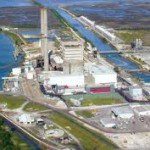Progress Energy Florida said that repairing its shut down Crystal River Nuclear plant is the best course of action for the company, and that it could have the plant online again by 2014.

In a filing with the Nuclear Regulatory Commission and the Florida Public Service Commission, Progress said that its initial analysis is that removing and replacing concrete in containment structure walls at the plant is the best option for repairing damage sustained during a repair on earlier damage from 2009.
Work to create an opening in the plant’s containment building to put in a new steam generator caused a separation in concrete in the containment building. The unit was shut down at the time.
The preliminary cost estimate for the repair is between $900 million and $1.3 billion, the company said.
“The company is moving forward systematically and will perform additional detailed engineering analyses and designs, which could affect any final repair plan,” Progress said in a statement accompanying its filing. “This process will lead to more certainty for the cost and schedule of the repair. The company will continue to refine and assess the plan (and the prudence of continuing to pursue it) based on new developments and analyses as the process moves forward. A number of factors could affect the repair plan, the return-to-service date and costs, including regulatory reviews, the ultimate work scope, engineering designs, testing, weather and other developments.”
The company, which is in the process of being acquired by Duke Energy, plans to discuss its plans in detail with the Public Service Commission on July 14.
“This would be a major repair, requiring significant cooperation and coordination with state and federal regulators and others,” said Vincent Dolan, Progress Energy Florida president and CEO. “Based on our initial review, our objective is to return the plant to service to ensure that it continues to be a safe, dependable and emission-free resource to meet our customers’ energy needs reliably and affordably for many years to come.”
Dolan said the Crystal River plant is the company’s most cost-effective and saves customers about $300 million a year in fuel costs when it’s running.


